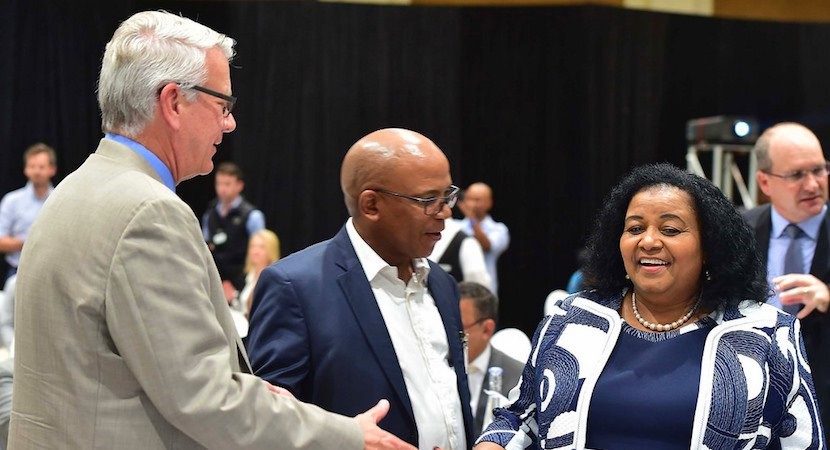The Constitution is all minority groups have to keep them safe.
Is there anybody in the ANC defending the Constitution? No. Because they solidly vote for Jacob Zuma
Glynnis Breytenbach A Memoir – Rule of Law (Pan McMillan, 2017)
In two previous articles I highlighted the appalling legal and juridical consequences of the ANC’s illegal deployed cadre policy. In those articles I outlined how the late Dullah Omar, then Minister of Justice and Dr Zola Skiwyeye, then Minister of Public Services had, with typical ANC corruption, prevented a highly qualified white Afrikaans male with decades of institutional knowledge and experience – Johan Bruwer, then deputy chief state law adviser - from getting the job which the ANC regarded as strategically vital. The post of Chief State Law Adviser. Instead a crony of Omar, in fact someone who had worked for him, Enver Daniels, was appointed and the sordid aftermath is common knowledge. Bruwer took his case to the CCMA where he was bound to win and was paid with your money and mine to go away. This is standard procedure for a political party which is devoid of conscience and moral compass, focused manically on self-enrichment and constantly associates with nations with appalling human rights records while, to appease China, denying the Dalai Lama an entry visa.
In this and a subsequent article, I will reveal how much of the legislation promulgated by the African National Congress since 1994 is fatally flawed and, in an ideal world, would be repealed. That, in my subjective opinion, is the legal Mother of All Bombs. But, in the world of the Absolutely No Consequences Party - to use Mangosuthu Buthelezi’s term - this legal Bunker Buster will probably have no consequences whatsoever.
The rampant corruption we are seeing in government today is an abuse and a betrayal of the power South Africans entrust to politicians and government officials so that they may govern South Africa in the interests of and for the benefit of the people. This corruption does not only make a few powerful people rich at the expense of the many, it also corrupts the systems of government upon which a functioning democracy is based.
Parliament is an obvious example as is the corruption of State-owned enterprises and institutions such as the police services, the justice department and other instruments of state security. Their powers are increasingly being applied to defending criminals against the wrath of the people as opposed to the other way round. Or, as Blade Nzimande has warned: … the political elite, brazenly use state institutions to ruthlessly acquire wealth and crush whoever stands in their way.
This has aptly been termed State Capture.
Another less obvious form of state capture is the corruption of legal process in ways that undermine the integrity and functioning of the state.
The use of so-called Stalingrad litigation techniques when defending what are often the clearly-unlawful actions of government is one example of this. The assistance the National Public Prosecutor and others is providing the president in efforts to avoid his day in court is just one example of the way this tactic is constantly utilised.
The failure of government departments to follow due process when making regulations and issuing proclamations is another, perhaps more insidious example of an abuse of the power entrusted to politicians and officials in government.

Environmental Affairs Minister Edna Molewa at the investor luncheon held ahead of 2017 State of the Nation Address.
The wide-spread and ongoing failure of the Department of Environmental Affairs Minister, Edna Molewa, and officials in her department to respect due process when making regulations and issuing proclamations in terms of the National Environmental Management Biodiversity Act or NEMBA is one example of this.
The investigation that is detailed in the Cox Attorneys letter to the Minister of Environmental Affairs – which will be carried in a subsequent article - reveals that she and her predecessors have failed to comply with the statutory rules that require a Minister to engage with the public and invite comment on such measures before they are made law. The result of this failure to consult by publishing draft laws for comment is that every law passed under NEMBA that required this process of public engagement is now liable to, or could potentially, be set aside as unlawful.
This failure to follow the simple rules of legitimate law making speaks to a catastrophic failure of governance that affects South Africa’s ability to lawfully deal with the scourge that is rhino poaching, not to mention important matters such as biosecurity at our national borders.
This is the obvious practical effect of a failure to comply with due process but the actual effects are far more serious.
Firstly as Cox points out, NEMBA is not the only environmental law that requires a process of consultation and engagement before environmental laws are made. Similar provisions exist in other national environmental laws. If the Minister failed to follow due process when making laws under NEMBA, then it is likely that she has done so when making laws under these other environmental statutes.
But far more serious than this is the fact that this failure to follow due process undermines the rule of law and the functioning of our constitutional democracy. The concept and principle that South Africans all have the right to participate in government lies at the heart of our democracy. The right to vote is fundamental to this. But so, too, is the right to participate in the process of law making through the statutory consultation processes such as those that the DEA Minister is ignoring when making laws under NEMBA.
We have seen how factional and sometime corrupt party politics is compromising the effectiveness of Parliaments both at national and provincial level. Local government is also being compromised. of the people’s right to participate in the law-making process through a process of consultation.
If that is one horn of the pincer movement that is engulfing our constitutional democracy and if the centre is corruption, then the other horn is the destruction
Institutions that are meant to protect South Africa’s people from such onslaughts are collapsing one by one.
The courts and the will of the people are the only remaining protections against the total annihilation of our constitutional democracy. And the courts cannot hold out alone forever.
Democracy will fail in South Africa if South Africa’s people do not defend it.
The second half of this article, the letter to the Minister, will be published shortly. It was copied to her and all the relevant department officials, a fortnight ago.
The Cox Attorneys letter reveals how much of our environmental legislation does not pass legal and constitutional muster because the ANC-controlled government has blithely ignored the fact that proposed legislation must be submitted to a public consultation process before being promulgated. This includes the timeous publication in the requisite newspapers of notices inviting the public to participate in these processes.
A failure to do this and to provide adequate information regarding the proposed measure in the notice was why the DEA lost the rhino horn moratorium court case.
We are looking at what, on the face of it, looks like a long-term and possibly widespread abuse by government of the law-making process. Government and, in particular, the Minister of Environmental Affairs are under a duty to remedy this abuse. This means withdrawing laws that have been promulgated without following due process or applying to court for temporary relief where the immediate withdrawal of those laws would cause public harm.

Rhino horn poaching
It remains to be seen if the Minister will respond as she is obliged to do.
The practical consequence of the Cox Attorneys letter, as I see it, is that any future accused facing prosecution under the NEMBA Act need only refer to the that letter and then rest their case.
If adequate steps are not taken to redress the situation, it will go to the Public Protector who could well ignore it as well.
Then the courts would be asked to step in and tell government to do what it should do as a matter of course.
There is a limit to how long our courts can stand up to government. Indeed it already looks like the Minister and SASSA are frustrating the judgement of the Constitutional Court in the Cash Paymaster Services case. Ultimately the people of South Africa need to realise that if they do not defend their rights they will surely lose them.
The second part of this article covers the letter which Cox Attorneys sent to Minister Molewa.
A legal MOAB – Part 2
In a previous introductory article on the potential impact of the ANC government’s routine contravention of the laws relating to the necessity of public consultation in the drafting of laws, I emphasised the impact that this was already having in environmental legislation, most specifically rhino poaching.
The letter from Cox Attorneys to the Minister of Environmental Affairs, Edna Molewa, potentially impacts on all laws promulgated since the African National Congress came to power 23 years ago.
The response from the ANC is predictable - receipt of your letter is acknowledged and we will revert to you in due course.
Thereafter the Stalingrad option will be used – using your money and mine.
The already debilitating load borne by our courts is about to get much, much worse.
